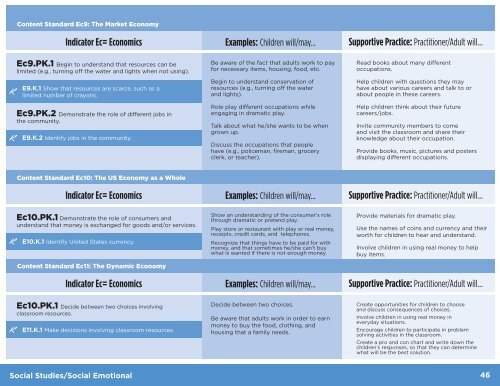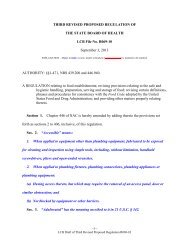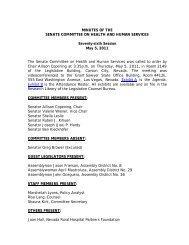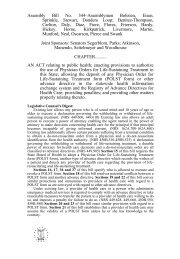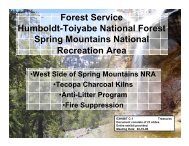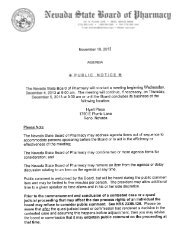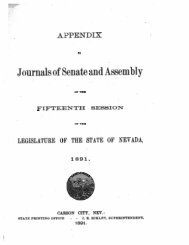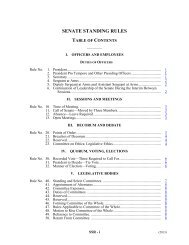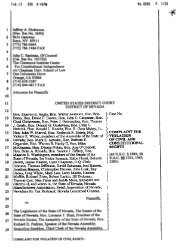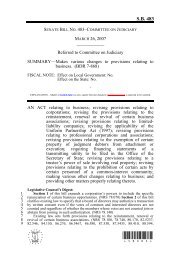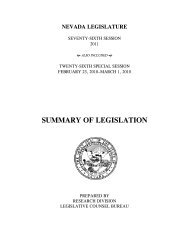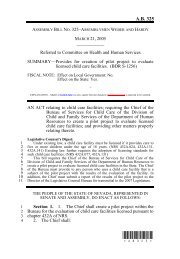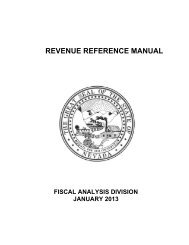Nevada Pre-Kindergarten Standards
Nevada Pre-Kindergarten Standards
Nevada Pre-Kindergarten Standards
You also want an ePaper? Increase the reach of your titles
YUMPU automatically turns print PDFs into web optimized ePapers that Google loves.
Content Standard Ec9: The Market Economy<br />
Indicator Ec= Economics<br />
Ec9.PK.1 Begin to understand that resources can be<br />
limited (e.g., turning off the water and lights when not using).<br />
E9.K.1 Show that resources are scarce, such as a<br />
limited number of crayons.<br />
Ec9.PK.2 Demonstrate the role of different jobs in<br />
the community.<br />
E9.K.2 Identify jobs in the community.<br />
Content Standard Ec10: The US Economy as a Whole<br />
Indicator Ec= Economics<br />
Ec10.PK.1 Demonstrate the role of consumers and<br />
understand that money is exchanged for goods and/or services.<br />
E10.K.1 Identify United States currency.<br />
Content Standard Ec11: The Dynamic Economy<br />
Indicator Ec= Economics<br />
Ec10.PK.1 Decide between two choices involving<br />
classroom resources.<br />
E11.K.1 Make decisions involving classroom resources.<br />
Social Studies/Social Emotional<br />
Examples: Children will/may...<br />
Be aware of the fact that adults work to pay<br />
for necessary items, housing, food, etc.<br />
Begin to understand conservation of<br />
resources (e.g., turning off the water<br />
and lights).<br />
Role play different occupations while<br />
engaging in dramatic play.<br />
Talk about what he/she wants to be when<br />
grown up.<br />
Discuss the occupations that people<br />
have (e.g., policeman, fireman, grocery<br />
clerk, or teacher).<br />
Examples: Children will/may...<br />
Show an understanding of the consumer’s role<br />
through dramatic or pretend play.<br />
Play store or restaurant with play or real money,<br />
receipts, credit cards, and telephones.<br />
Recognize that things have to be paid for with<br />
money, and that sometimes he/she can’t buy<br />
what is wanted if there is not enough money.<br />
Examples: Children will/may...<br />
Decide between two choices.<br />
Be aware that adults work in order to earn<br />
money to buy the food, clothing, and<br />
housing that a family needs.<br />
Supportive Practice: Practitioner/Adult will…<br />
Read books about many different<br />
occupations.<br />
Help children with questions they may<br />
have about various careers and talk to or<br />
about people in these careers.<br />
Help children think about their future<br />
careers/jobs.<br />
Invite community members to come<br />
and visit the classroom and share their<br />
knowledge about their occupation.<br />
Provide books, music, pictures and posters<br />
displaying different occupations.<br />
Supportive Practice: Practitioner/Adult will…<br />
Provide materials for dramatic play.<br />
Use the names of coins and currency and their<br />
worth for children to hear and understand.<br />
Involve children in using real money to help<br />
buy items.<br />
Supportive Practice: Practitioner/Adult will…<br />
Create opportunities for children to choose<br />
and discuss consequences of choices.<br />
Involve children in using real money in<br />
everyday situations.<br />
Encourage children to participate in problem<br />
solving activities in the classroom.<br />
Create a pro and con chart and write down the<br />
children’s responses, so that they can determine<br />
what will be the best solution.<br />
46


